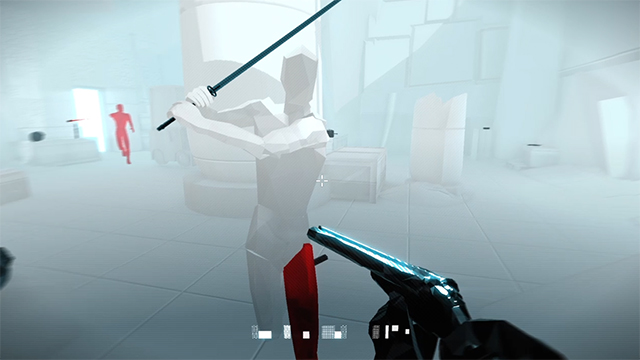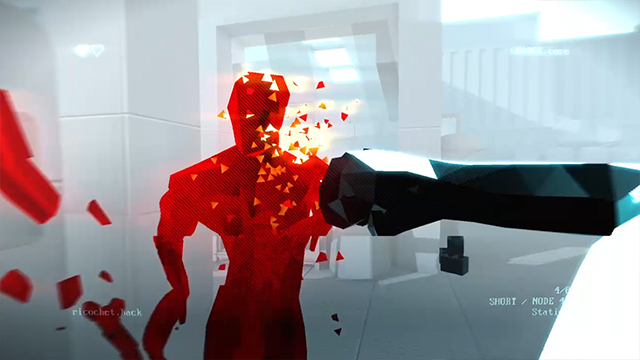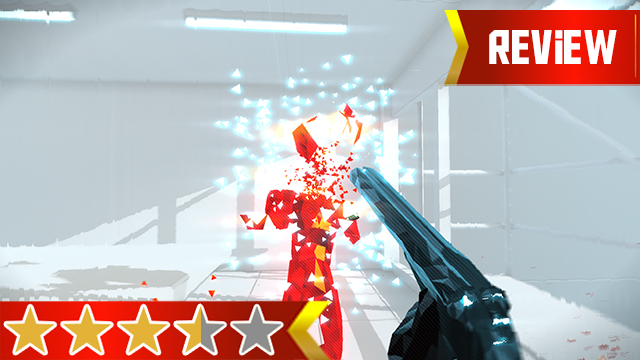Superhot directly told people it was one of the most innovative shooters of all time, but it was right. Tying the movement of time to physical movement intelligently blended strategy and action and made every level unfold like a YouTube compilation of John Wick’s most impressive scenes. Superhot: Mind Control Delete is the follow-up expansion that notably expands upon the main title’s undeniable style and even though it does so cleverly in some areas, the game as a whole ends up being MORE in ways that begin to suffocate its simplistic foundation.
Expanding into MORE complex territory

“MORE,” as the game continually reminds you at every turn, is excellent a lot of the time because of how unique Superhot still is. Bludgeoning or blasting Red Dudes is a thrill no other game can match because of how it blends tactical movement and action in a stylistic wrapper. Figuring out what to pick up and what to throw or use is tantamount to success and there are enough options there to truly evoke the gratifying sense of improvisation that’s so vital in martial arts films. Performing these acts of loosely choreographed mayhem is inherently satisfying, but viewing your actions in real-time at the end is a gratifying way to document your violent achievements.
Mind Control Delete isn’t just MORE as it adds to this blueprint as well through a handful of additional enemy types and an entirely new perk system. Both of these are at the behest of the title’s semi-roguelite structure. There are some Red Dudes that are only vulnerable on a single part of their body, ones that don’t drop ever their weapon, invincible “mini-bosses” with different powers that can chase you, and spiky variants that explode when you murder them a certain way. None of these additions are cheap or lackadaisical, but instead are carefully crafted to inject more variables into the game and ward off stagnation.
The perk and upgrade system produce new tools to combat these previously unseen threats and lie at the bedrock of its roguelite base. Players can earn different abilities by completing certain sets of levels and they’re divided up into two categories: powers you pick before each set of levels that grant new skills called Cores and tools you choose every few levels that enhance your abilities called Hacks.
Cores allow for a substantial playstyle change — like being able to throw and recall a katana or instantly dash to a nearby enemy — while choosing between two random Hacks every couple of levels opens the door for more minute augmentations like exploding throwable objects and instant reloads after kills. By having so many different components that all interact with one another, Mind Control Delete is predisposed to give everyone a unique and deeper experience each time. Both types of upgrades are rewarding in their own ways — especially throwing a katana around like Kratos’ axe — and yield different types of highlights depending on your loadout.
This approach better suits the game’s roguelite nature as levels are randomly assembled and play out differently in most instances. New threats and spawn points constantly shift the same levels around to partially mask how much of it is being repeated over the course of the campaign. Mind Control Delete is fundamentally constructed around replayability almost as if to make up for how brief its predecessor was.
MORE game, MORE problems

And while that game was elegantly succinct, Mind Control Delete is poised to tire players out by creating an experience that is designed to point out on how repetitive it is. The randomized tricks the game pulls to add replayability simply do not last through its nine-hour story mode because of how often you’ll see the same things for an extended period of time. Overstuffing the campaign with superfluous chapters undoes a lot of the work those RPG elements bring and demonstrates that a shorter game would have been able to nimbly conceal the undeniable amount of recycling. Focusing its replayable features in optional modes likely would have been ideal instead of jamming a ton of levels into the critical and side paths.
All of this compounds in the latter third of the game as it not only points out its needless stages, but also the folly of its roguelite design that further displays how often everything cycles through. By default, players get two hit points to clear any of the game’s sets of levels and losing all of them sends you back to the beginning of that set.
Conceptually, this is supposed to add tension but it ends up turning the difficult puzzles into tedious hiding exercises. Levels are generally much less arduous than the last game since they’re meant to be part of a group of challenges instead of the challenge itself.
As you progress, these batches get longer and longer and drive up the stakes but in ways that only encourage safe, boring play over more risky and exciting action. Cowering away and just luring Red Dudes into death traps becomes preferable to getting clipped and having to replay another 15 minutes of a game that has already gone on too long. You don’t necessarily have to get better at the standalone expansion to beat the later stages; you just have to have more patience and endurance.
Mind Control Delete almost seems aware of this amount of bloat with its constant fascination with the concept of “MORE.” It juxtaposes this all-caps phrase into its trophies and achievements and uses it in text as a commentary on expansions of people’s obsessions with long video games and the urge to want, well, more. Superhot was wonderfully brief, but, given the current climate, some of these insatiable gamers probably wanted it to be longer because of an ever-inflating sense of value that every game “needs.”
Seeing an expansion contend with the notion of expansions is clever and entirely within the boundaries established in the VR and non-VR entries in the series. And even though the game more than proves its points at the detriment to the pacing, the bloat serves the strange story that breaks the fourth wall and constantly spirals into greater degrees of lunacy. This unorthodox method of storytelling coalesces in the bizarre ending that feels like a surreal meme that’s been mashed up with parts of The Matrix to skewer the video game medium with also intuitively using that medium as the skewer.
Final verdict

Superhot: Mind Control Delete’s obsession with MORE makes for an inventive narrative hook and leads to some meaningful gameplay additions, but that central theme also ends up dampening its best features. Mixing branching upgrade paths with the sublime impromptu core Superhot gameplay makes this standalone expansion a blast for more than a few hours as it continually supplies new ways to experience the same game. But the newfound sense of replayability begins to dissipate as those same tricks are repeatedly pulled over the course of the overly long campaign and all but guarantee some fatigue despite the constantly changing variables. Superhot left players wanting MORE and Mind Control Delete demonstrates that that might have been a good idea.
GameRevolution reviewed Superhot: Mind Control Delete on PS4. Code provided by the publisher.
-
Utterly bizarre narrative that continually messes with you.
-
Excellent time-manipulation shooting has been cleverly expanded upon.
-
Roguelike nature and new powers allow for more replayability.
-
The campaign wears out its welcome and is multiple times longer than its predecessors.
-
Having to survive over a dozen levels in a row is a tedious form of challenge.
-
Free for those on PC, PS4, and Xbox One who bought Superhot before MCD's release.











